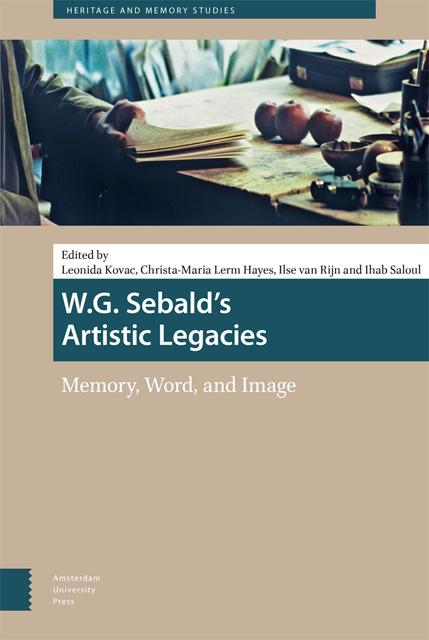13 - Sebald’s Toute la mémoire du monde
Published online by Cambridge University Press: 26 October 2023
Summary
Abstract
In 1956 Alain Resnais opened his film-essay Toute la mémoire du monde with the statement that owing to the short-lived nature of human remembering, people tend to accumulate countless auxiliary memories. The issue of “auxiliary memories” related to the search for one’s own identity is an ostinato theme of Sebald’s last novel Austerlitz where the titles and certain motifs articulated in three films by Resnais are appropriated in order to depict the twentieth century in terms of the uncanny. It was not by chance that a Jewish boy named Jacques Austerlitz, before he was sent from Prague in England by the last Kindertransport, and his mother to Theresienstadt, spent his last summer with the parents in Marienbad, a place to which he would return many years later and become haunted by something unknown. In Sebald’s narrative tissue such reference to L’Année dernier á Marienbad (Last Year at Marienbad) rhizomatically lead to 1955 Resnais’s film-essay Nuit et brouillard (Night and Fog), as well as to the psychoanalytic notion of the originally lost object. But, in the novel, Resnais is explicitly mentioned only once, in Austerlitz’s remembrance of the scene from Toute la mémoire du monde as fantastic and monstrous owing to footage of the Bibliothèque nationale de France in Paris that shows the transportation of notes from reading room to storage. The performative of Sebald’s “monstrosity” is through narrative transversal related to the erasure of historical (holocaust) memory: the new library—erected on a site where Nazis had stored Jewish property which they had stolen during the Second World War—was, following a 1988 decision by the French president, to be the most modern and biggest library building in the world.
Keywords: Architecture and Philosophy, Auxiliary Memories, Translation, Uncanny, Film and Novel
Alain Resnais’s essay film Toute la mémoire du monde (1956) opens with the claim that “because he has a short memory man amasses countless memory aids.”
- Type
- Chapter
- Information
- W. G. Sebald's Artistic LegaciesMemory, Word, and Image, pp. 243 - 260Publisher: Amsterdam University PressPrint publication year: 2023

